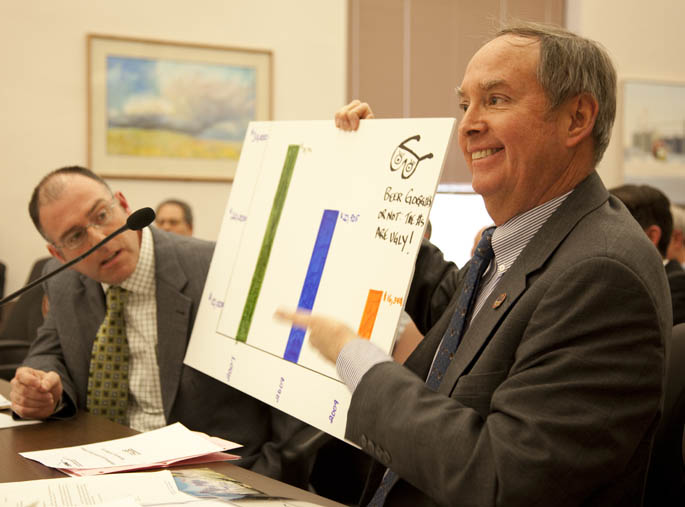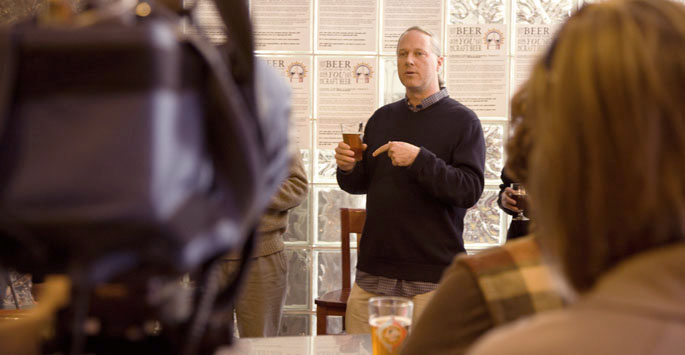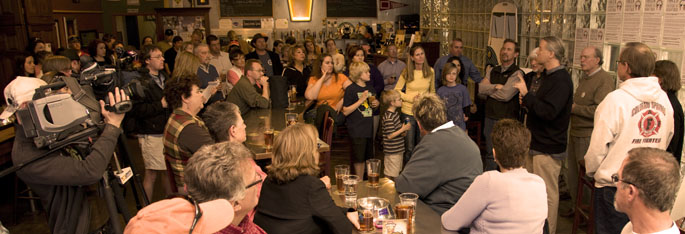It's not a fluke that Colorado is at the forefront of craft beer. It's not the water. It's not the clean mountain air or talented workforce. It's the set of laws that make up the Colorado Beer Codes and Colorado Liquor Codes. Those regulations, warts and all, have incubated and fostered a thriving brewing industry that is the envy of beer lovers worldwide.
Two new bills in the Colorado Legislature are aiming to change the regs, and in the process change the equation that has allowed so many small, independent craft brewers to prosper and provide us with so much great beer. House Bill 1284 (sponsored by Republican Larry Liston from Colorado Springs) and Senate Bill 194 (sponsored by Democrat Betty Boyd of Lakewood) both aim to tinker with laws about who can sell what kind of beer, and allow grocers and/or convenience stores to sell all types of beer, not just the 3.2% ABW beer they are permitted to sell now.
In theory, this all sounds great. After all, as Mr. Liston is fond of reminding us, "its good for the consumer" (not him, of course - he doesn't drink beer). None of this is new: it’s the fourth straight year that a bill has been introduced in the Colorado legislature (the third time for a bill from Mr. Liston) that would radically change alcohol regulations.

Who these bills will really benefit is the convenience store and grocery industry. They say they’ve been hurt since liquor stores were allowed to open on Sundays. C-store owners and grocers desperately want to sell craft beers in their Colorado stores. It is, after all, the fastest-growing segment of the beer industry by far, and premium brands command premium prices. But don’t expect to see Yellow Kite or Avery IPA in your corner 7-11 or nearby City Market.
For brewers, it's about access to market. Safeway is not interested in a few dozen cases. They want a few dozen HUNDRED cases, and your favorite 10-barrel-system brewer can't deliver that much. So they get passed over. Specialty niche products (like craft beer) need specialty niche retailers, and 7-11 stores don't have the shelf space, supply chains or profit margins to accommodate craft brewers.
Liquor store owners will take it in the shorts pretty hard, too, and if either of the two bills are passed, they will see a fall-off in beer sales. Liquor retailers - who by law can own only one retail store - are concerned that c-stores and grocers will erode their customer base. Beer accounts for more than half the sales in a typical Colorado liquor store, and they can’t sell much more than just alcohol, either - no food, snacks, gasoline. So if their customers can pick up their Chimay along with chips, cheese and Charmin, they won’t be coming in to buy beer as often. Liquor store owners fear that they could lose from 15% to 25% of total sales to c-stores and grocers.
At It Again...
The Colorado Brewers Guild is opposed to the bills, and champions many causes for its members. (Disclosure: BDG2C=CBG member, OK?) Last April, Senate Bill 83, as it wandered its way through the legislative process, was amended by (guess who!) Rep. Liston. It required the testing and disclosure of alcohol content in all beer sold in the state, and was a tedious and unnecessary law that imposed expensive demands on all brewers and restaurants.
It also required Colorado Liquor Enforcement to craft new rules.
CBG was involved in discussions to figure out ways to make the law work, and Colorado Liquor Enforcement cobbled together new regulations. Amidst cries of croneyism, Governor Hickenlooper’s staff intervened and axed the new regulations entirely. Rep. Liston cried foul, and convened a special panel to discuss the propriety of it all. He asked Laura Harris, in charge of Colorado Liquor Enforcement, if she felt her time had been wasted on needless government activities. “All of the time, and the money, and the effort that was expended, all that work and effort and time was basically thrown out?” Hey, it’s your tax dollar at work.
Guild director John Carlson says that legislators are fatigued and surly on this this issue, and it’s no wonder. This is the fourth year in a row that the Colorado legislature has tried to hack apart liquor and beer codes to benefit convenience store and grocery store owners.
Senator Lois Tochtop from Thornton calls the bills distractions. In a Denver Business Journal article, she was quoted, “We are in a fiscal crisis. We should be focusing on how to create jobs, not proposing bills we know will kill Colorado jobs and close local businesses. It doesn’t make sense, especially when you consider the effort we give to prevent drinking and driving while these bills would allow stores to sell alcohol in the same place people buy gas.”
Unforeseen and unintended consequences...
Colorado brewers enjoy a unique business opportunity, thanks to existing beer and liquor codes. If they make less than 300,000 gallons of beer per year, a small brewer can cut out the distributor and sell direct to restaurants, bars and liquor stores. Bottle a few cases, sell beer a little bit at a time, develop a following. Since every liquor store is individually-owned, small brewers often develop personal business ties with dozens of liquor retailers, and make money by making craft beer at their own pace and slowly building capacity. It’s a relationship that worked well for Kim Jordan, Doug Odell, Dale Katechis, and many other successful brewers in Colorado.
But the new legislative proposals favoring c-stores and grocers will alter these relationships. Nic Chase, Beer Manager/Beer Buyer of Lukas Liquors Superstore in Lone Tree sums it up: "I have a personal relationship with a lot of Colorado craft brewers. They know that they can bring a new beer to me, and I will check it out. The big chain stores won't have room for the small guys. Where is somebody like Crabtree Brewing going to go?”

Mike Bristol says that “where” may mean another state. Since 1994 he’s turned out beer that has satisfied customers and wowed judges, and he’s grown his business in Colorado Springs a few dozen cases at a time, a few new liquor store customers at a time. Today, Bristol Brewing employs over 15 people, distributes to hundreds of stores, and is active in the community by supporting dozens of non-profit groups annually.
Bristol says that the proposed bills will hurt craft brewers because beer sales will be siphoned away from liquor stores that stock their beer. C-stores and grocers don’t have the interest or capacity to stock his beers, so his sales will suffer.

What happens if foam hits the fan, and grocers and convenience stores take away customers from liquor retailers? Bristol said his business would be forced into “survival mode”, and predicted layoffs in his operation or possibly selling his beer out of state. He’s been planning a move across the street into a bigger historic space, but that move may have to wait.
Continued access to market and cooler space is critical for brewers and consumers alike. If c-stores and grocers gain market dominance at the detriment to liquor stores, then the favorable bottom-up business climate that has nurtured many great brewers in Colorado could vanish.
Colorado liquor and beer codes are due for a comprehensive re-write, with plenty of room for improvement. But it’s these boneheaded incremental attempts at hacking away one part of code, without considering its effects on other parts of the code, that should rile up beer lovers and voters alike. There are big costs and tradeoffs in washing away existing regulations that benefit small businesses and enable growth to our Colorado beer culture.
Hey, we love low, low prices and Sierra Nevada at the Kum’n’Go as much as anybody, but really - how in the hell are we going to fund a $1 billion budget shortfall, Rep. Liston? Aren’t there more important issues to consider right now? These laws will kill local jobs, hurt Colorado businesses and benefit out-of-state corporations.
We want to know: why is this so important? Why must we revisit this again and again? Isn't there more pressing business?
The problem with 1284, and all these special interest bills, is a shortsighted and foolish assumption that "beer is beer", and a naive notion (as Mr. Liston puts it) that "competition makes us all better." As consumers, we have the ultimate say: money talks, and if we choose to support small businesses and fledgling craft brewers, then we will reap the benefits of local profits that feed back into the community.
The beer world will keep changing, and if either HB 1284 and/or SB 194 become the law of the land, it will be a change for the worse. We all want more convenience, more choice, more bang for our buck. But all that comes with costs, and reducing the market opportunities for small brewers means that many of the beers we now buy will be pushed off store shelves.
Think of it like this. If it comes down to stocking only two beers in your local cooler, they’re both going to be named Bud.
Two new bills in the Colorado Legislature are aiming to change the regs, and in the process change the equation that has allowed so many small, independent craft brewers to prosper and provide us with so much great beer. House Bill 1284 (sponsored by Republican Larry Liston from Colorado Springs) and Senate Bill 194 (sponsored by Democrat Betty Boyd of Lakewood) both aim to tinker with laws about who can sell what kind of beer, and allow grocers and/or convenience stores to sell all types of beer, not just the 3.2% ABW beer they are permitted to sell now.
In theory, this all sounds great. After all, as Mr. Liston is fond of reminding us, "its good for the consumer" (not him, of course - he doesn't drink beer). None of this is new: it’s the fourth straight year that a bill has been introduced in the Colorado legislature (the third time for a bill from Mr. Liston) that would radically change alcohol regulations.

Photo by Mike Laur © DG2C
Rep. Larry Liston (right) from the February 2010 committee meeting on House Bill 1186 - the last attempt to give large corporations more power. Rep. Liston is behind House Bill 1284.
Who these bills will really benefit is the convenience store and grocery industry. They say they’ve been hurt since liquor stores were allowed to open on Sundays. C-store owners and grocers desperately want to sell craft beers in their Colorado stores. It is, after all, the fastest-growing segment of the beer industry by far, and premium brands command premium prices. But don’t expect to see Yellow Kite or Avery IPA in your corner 7-11 or nearby City Market.
For brewers, it's about access to market. Safeway is not interested in a few dozen cases. They want a few dozen HUNDRED cases, and your favorite 10-barrel-system brewer can't deliver that much. So they get passed over. Specialty niche products (like craft beer) need specialty niche retailers, and 7-11 stores don't have the shelf space, supply chains or profit margins to accommodate craft brewers.
Liquor store owners will take it in the shorts pretty hard, too, and if either of the two bills are passed, they will see a fall-off in beer sales. Liquor retailers - who by law can own only one retail store - are concerned that c-stores and grocers will erode their customer base. Beer accounts for more than half the sales in a typical Colorado liquor store, and they can’t sell much more than just alcohol, either - no food, snacks, gasoline. So if their customers can pick up their Chimay along with chips, cheese and Charmin, they won’t be coming in to buy beer as often. Liquor store owners fear that they could lose from 15% to 25% of total sales to c-stores and grocers.
At It Again...
The Colorado Brewers Guild is opposed to the bills, and champions many causes for its members. (Disclosure: BDG2C=CBG member, OK?) Last April, Senate Bill 83, as it wandered its way through the legislative process, was amended by (guess who!) Rep. Liston. It required the testing and disclosure of alcohol content in all beer sold in the state, and was a tedious and unnecessary law that imposed expensive demands on all brewers and restaurants.
It also required Colorado Liquor Enforcement to craft new rules.
CBG was involved in discussions to figure out ways to make the law work, and Colorado Liquor Enforcement cobbled together new regulations. Amidst cries of croneyism, Governor Hickenlooper’s staff intervened and axed the new regulations entirely. Rep. Liston cried foul, and convened a special panel to discuss the propriety of it all. He asked Laura Harris, in charge of Colorado Liquor Enforcement, if she felt her time had been wasted on needless government activities. “All of the time, and the money, and the effort that was expended, all that work and effort and time was basically thrown out?” Hey, it’s your tax dollar at work.
Guild director John Carlson says that legislators are fatigued and surly on this this issue, and it’s no wonder. This is the fourth year in a row that the Colorado legislature has tried to hack apart liquor and beer codes to benefit convenience store and grocery store owners.
Senator Lois Tochtop from Thornton calls the bills distractions. In a Denver Business Journal article, she was quoted, “We are in a fiscal crisis. We should be focusing on how to create jobs, not proposing bills we know will kill Colorado jobs and close local businesses. It doesn’t make sense, especially when you consider the effort we give to prevent drinking and driving while these bills would allow stores to sell alcohol in the same place people buy gas.”
Unforeseen and unintended consequences...
Colorado brewers enjoy a unique business opportunity, thanks to existing beer and liquor codes. If they make less than 300,000 gallons of beer per year, a small brewer can cut out the distributor and sell direct to restaurants, bars and liquor stores. Bottle a few cases, sell beer a little bit at a time, develop a following. Since every liquor store is individually-owned, small brewers often develop personal business ties with dozens of liquor retailers, and make money by making craft beer at their own pace and slowly building capacity. It’s a relationship that worked well for Kim Jordan, Doug Odell, Dale Katechis, and many other successful brewers in Colorado.
But the new legislative proposals favoring c-stores and grocers will alter these relationships. Nic Chase, Beer Manager/Beer Buyer of Lukas Liquors Superstore in Lone Tree sums it up: "I have a personal relationship with a lot of Colorado craft brewers. They know that they can bring a new beer to me, and I will check it out. The big chain stores won't have room for the small guys. Where is somebody like Crabtree Brewing going to go?”

Photo by Mike Laur © DG2C
Mike Bristol, owner of Bristol Brewing Co., expresses his dismay with HB 1284 and SB 194 to reporters, patrons, and non-profit groups at a "Save the Ales" event.
Mike Bristol says that “where” may mean another state. Since 1994 he’s turned out beer that has satisfied customers and wowed judges, and he’s grown his business in Colorado Springs a few dozen cases at a time, a few new liquor store customers at a time. Today, Bristol Brewing employs over 15 people, distributes to hundreds of stores, and is active in the community by supporting dozens of non-profit groups annually.
Bristol says that the proposed bills will hurt craft brewers because beer sales will be siphoned away from liquor stores that stock their beer. C-stores and grocers don’t have the interest or capacity to stock his beers, so his sales will suffer.

Photo by Mike Laur © DG2C
What happens if foam hits the fan, and grocers and convenience stores take away customers from liquor retailers? Bristol said his business would be forced into “survival mode”, and predicted layoffs in his operation or possibly selling his beer out of state. He’s been planning a move across the street into a bigger historic space, but that move may have to wait.
Continued access to market and cooler space is critical for brewers and consumers alike. If c-stores and grocers gain market dominance at the detriment to liquor stores, then the favorable bottom-up business climate that has nurtured many great brewers in Colorado could vanish.
Colorado liquor and beer codes are due for a comprehensive re-write, with plenty of room for improvement. But it’s these boneheaded incremental attempts at hacking away one part of code, without considering its effects on other parts of the code, that should rile up beer lovers and voters alike. There are big costs and tradeoffs in washing away existing regulations that benefit small businesses and enable growth to our Colorado beer culture.
Hey, we love low, low prices and Sierra Nevada at the Kum’n’Go as much as anybody, but really - how in the hell are we going to fund a $1 billion budget shortfall, Rep. Liston? Aren’t there more important issues to consider right now? These laws will kill local jobs, hurt Colorado businesses and benefit out-of-state corporations.
We want to know: why is this so important? Why must we revisit this again and again? Isn't there more pressing business?
The problem with 1284, and all these special interest bills, is a shortsighted and foolish assumption that "beer is beer", and a naive notion (as Mr. Liston puts it) that "competition makes us all better." As consumers, we have the ultimate say: money talks, and if we choose to support small businesses and fledgling craft brewers, then we will reap the benefits of local profits that feed back into the community.
The beer world will keep changing, and if either HB 1284 and/or SB 194 become the law of the land, it will be a change for the worse. We all want more convenience, more choice, more bang for our buck. But all that comes with costs, and reducing the market opportunities for small brewers means that many of the beers we now buy will be pushed off store shelves.
Think of it like this. If it comes down to stocking only two beers in your local cooler, they’re both going to be named Bud.
